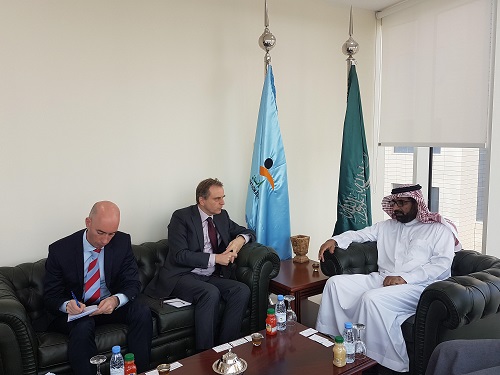The Ambassador of the Netherlands to the Kingdom visits the National Assembly for Human Rights

On Thursday, 23/3/1438 AH, the Ambassador of the Kingdom of the Netherlands Mr. Joost Rnches and the first embassy secretary Mr. Yaron Khanmka have visited the National Society for Human Rights. They were received by HE the Chairman of the National Human Rights Society Dr. Mufleh Rabiean Al-Qahtani, the Secretary General of the Society Mr. Khaled Al-Fakhiri, member of the Society Dr. Ibrahim Suleiman and the Secretary of the Society’s Chairman Mr.Ahmed Al-Mahmoud.
At the beginning of the meeting, HE the chairman of the Society has given the delegation a brief explanation regarding the Society’s activities and its contribution in spreading the human rights culture as well as the human rights’ remarkable progress in the Kingdom and the efforts exerted for its enhancement.
Besides, they have discussed the Dutch government’s position on the ongoing events in the region including the Syrian crisis, the situation in Iraq and Yemen as well as the Iran’s intervention in the region and the impact of such conditions on human rights. The ambassador has also said that the issue needs more attention and care so as to maintain human rights.
In addition, they discussed the development witnessed by the Kingdom in the field of human rights and in particular women’s rights including her entry into the membership of the Shuraa Council and allowing her to participate in the municipal elections.
They have also discussed other human right issues including the death penalty and the position of the Netherlands of it. His Excellency the Chairman of the Society has clarified to the visiting delegation that this penalty, in the Kingdom, is based on the provisions of Al Shariah and that the final judgment is issued only after being considered by a large number of judges to ensure the achievement of justice and that the Society is keen to provide a fair trial in such cases. The state is seeking also with the parents in such cases to provide amnesty to the execution of the sentence and that the death penalties, which have recently carried out were against people accused of great crimes.
Moreover, they shed light on the Kingdom’s absorption of large numbers of the Syrian and Yemeni refugees and enable them to enjoy much of the rights such as employment, education, and treatment. They have also shed light on the significant progress in the field of the employee’s rights in the Kingdom.
Regarding the cases raised by the visiting Ambassador, they have indicated the legal position of them.
 Menu
Menu